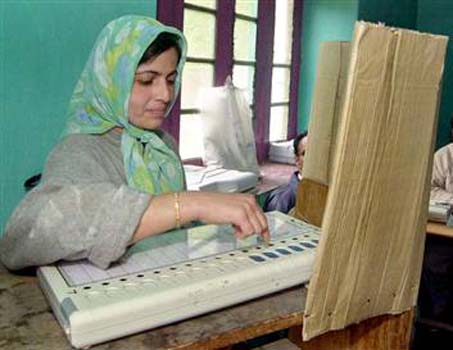India faces test in world's biggest elections after attacks, slowdown
 New Delhi - In the biggest democratic exercise on the planet, India plans month-long elections beginning April 16 when almost one-sixth of humanity selects its government as the country faces its toughest economic and national security challenges in recent years.
New Delhi - In the biggest democratic exercise on the planet, India plans month-long elections beginning April 16 when almost one-sixth of humanity selects its government as the country faces its toughest economic and national security challenges in recent years.
In the complex, five-phase polls marked with a colour and fervour unmatched in the world, an electorate larger than 714 million people are to elect 543 parliamentary representatives from 35 states and union territories, six major religions and several regional languages.
Seven national parties and 39 state-level parties have entered the race in the 15th edition of the elections across India, where Uttar Pradesh, Maharashtra, Andhra Pradesh, West Bengal, Bihar and Tamil Nadu are the most politically important states, accounting for 53 per cent of the total seats.
But hope, anger, anxiety, hype and passion are to be felt across the country for voting that is to prove a tremendous organizational test for authorities.
More than 6 million officials and security personnel have been tasked to supervise the polling through 1.3 million electronic voting machines at 828,800 stations through May 13. The results were to be announced May 16.
Yet with all the preparations involved, it might not be a smooth affair. These polls could be India's toughest elections with a fractured verdict and no single party winning a clear majority. Such an outcome would spell days of political uncertainty.
The main contest is between the ruling United Progressive Alliance (UPA), headed by the centrist Indian National Congress party, and the opposition National Democratic Alliance (NDA), led by the Hindu nationalist Bharatiya Janata Party (BJP).
With the middle class largely apathetic about elections, the voting, mostly by the rural poor, is generally carried out on considerations of caste, religion and regional lines.
While Prime Minister Manmohan Singh, who is credited with India's economic turnaround since the mid-1990s, is the UPA's choice for the top post again, the 76-year old soft-spoken economist is accused of being weak and "remote-controlled" by Congress party chief Sonia Gandhi.
The NDA's candidate is 81-year-old Lal Krishna Advani, a former deputy prime minister best known for divisive communal leadership and heading a campaign to have a temple built on the site of a mosque in the northern city of Ayodhya whose demolition led to deadly
1992 rioting. He is basing his campaign on the slogan "Strong Leader, Decisive Government."
Issues that are dominating the elections are the economic turmoil that has seen millions of job losses after five years of growth, which has averaged an annual 8.75 per cent, and a perilous internal security situation after terrorist attacks last year that included the three-day, coordinated shooting and bombing attacks on Mumbai in November, which left more than 170 people dead.
In 2004, the NDA lost the elections because its "India Shining" slogan, focussing on high economic growth rates, lacked resonance with the hinterland, bereft of the benefits of India's economic reforms.
Congress is hoping for a return to power by touting a pro-poor agenda and showcasing a rural employment programme and 15 billion dollars for a debt-relief package for impoverished farmers.
Amid the grim economic climate, the BJP has announced several financial pledges to better the lot of the rural poor and claims it would bring tough security laws to make amends for UPA's "soft" handling of terrorism.
It also reasserted its Hindu agenda by declaring it would rebuild the Ayodhya temple while hinting it would withdraw "appeasement policies" targeted at the Muslim minority.
What is clear is that the declining national parties are being challenged by their regional partners, confident of their indispensability.
If Congress and BJP, which have broad national appeal, are unable to win a mandate, an alliance of communist, small and regional parties, known as the Third Front, might form the government.
Such a coalition could see the rise of Mayawati - who represents Dalits, or former untouchables - as prime minister. India could also see protectionism flourish under such an outcome because the communists, who once supported the UPA, oppose reforms.
As India faces the spectre of political instability while vulnerable to terrorist attacks and as its economy wilts under the global recession, the elections are a trial of the faith Indians have in democracy.
They will test the Indian political system and determine whether the democratic process can yield a leadership to guide the young nation and its 1.17 billion people out of confusion and self-doubt. (dpa)